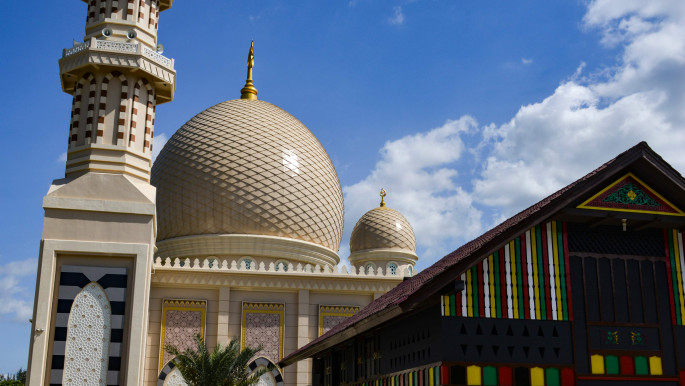Indonesia uses drones to count mosques to 'monitor radicalisation'
A government-led project aims to create a census of mosques from across Indonesia as part of efforts to tackle radicalisation.
2 min read
Earlier government estimates pegged the total number of mosques at more than 740,000 [Getty]
Indonesia is using drones to count the number of mosques in the Muslim-majority country in an effort to monitory potential radical hotspots.
Fakhry Affan leads a government team of 1,000, colloquially dubbed “Mosque Hunters’ who use drones to take pictures of these places of worship across Indonesia and its islands, including Sulawesi island.
The team, from the religious affairs ministry have spent years visiting the entirety of the 5,000 kilometre (3,100 mile) long archipelago to count the number of mosques in the world's biggest Muslim majority nation.
Affan's team began the census in 2013 and have so far registered 554,152 mosques, though that number is still only about 75 percent done, Affan says.
"Only God knows exactly how many mosques there are in Indonesia," former vice president Jusuf Kalla said recently.
"Some say around one million and people will take it for granted."
Read More: Stop Uighur internment camps or take the Olympics away from China
Earlier government estimates pegged the total at more than 740,000 nationwide, and with Indonesia’s 17,000 islands, that number is likely to be more.
Affan uploads the drone photos, as well as details about the mosques and their building permits onto an online database.
The government is also using the database to keep an eye on radicalism.
"Radical ideology can mushroom anywhere and mosques are one of the easiest places for it to spread," Affan told AFP.
"Why? Because you don’t need to invite people to the mosque, they'll come anyway.
"We want to ensure that all imams and (mosque) committees are moderate because Islam in Indonesia is moderate," he added.
The government is planning to launch an Android-based app called Info Masjid (Mosque Info) so Muslims can use their smartphone to find the nearest place of worship.
In 2018, Indonesia's intelligence agency said it had found dozens of mosques that catered to government workers spreading radicalism and calling for violence against non-Muslims -- in one Jakarta neighbourhood alone.
The alarming figures came several months after Indonesia's second-biggest city Surabaya was rocked by a wave of suicide bombings carried out by families at churches during Sunday services, killing a dozen people.
Fakhry Affan leads a government team of 1,000, colloquially dubbed “Mosque Hunters’ who use drones to take pictures of these places of worship across Indonesia and its islands, including Sulawesi island.
The team, from the religious affairs ministry have spent years visiting the entirety of the 5,000 kilometre (3,100 mile) long archipelago to count the number of mosques in the world's biggest Muslim majority nation.
Affan's team began the census in 2013 and have so far registered 554,152 mosques, though that number is still only about 75 percent done, Affan says.
"Only God knows exactly how many mosques there are in Indonesia," former vice president Jusuf Kalla said recently.
"Some say around one million and people will take it for granted."
Read More: Stop Uighur internment camps or take the Olympics away from China
Earlier government estimates pegged the total at more than 740,000 nationwide, and with Indonesia’s 17,000 islands, that number is likely to be more.
Affan uploads the drone photos, as well as details about the mosques and their building permits onto an online database.
The government is also using the database to keep an eye on radicalism.
"Radical ideology can mushroom anywhere and mosques are one of the easiest places for it to spread," Affan told AFP.
"Why? Because you don’t need to invite people to the mosque, they'll come anyway.
"We want to ensure that all imams and (mosque) committees are moderate because Islam in Indonesia is moderate," he added.
The government is planning to launch an Android-based app called Info Masjid (Mosque Info) so Muslims can use their smartphone to find the nearest place of worship.
 |
|
Keuchik Leumiek mosque in Banda Aceh [Getty] |
The alarming figures came several months after Indonesia's second-biggest city Surabaya was rocked by a wave of suicide bombings carried out by families at churches during Sunday services, killing a dozen people.
Members of an IS-loyal group tried to assassinate Indonesia's chief security minister last year, while in November a militant suicide bomber killed himself and injured six others during an attack at a police station.
In response, Indonesia's new vice-president Ma’ruf Amin, a cleric-turned-politician, has said the government would start certifying preachers and mosque congregations nationwide to stamp out militants in their ranks.





 Follow the Middle East's top stories in English at The New Arab on Google News
Follow the Middle East's top stories in English at The New Arab on Google News

![Israeli forces ordered bombed Gaza's Jabalia, ordering residents to leave [Getty]](/sites/default/files/styles/image_330x185/public/2176418030.jpeg?h=a5f2f23a&itok=_YGZaP1z)
